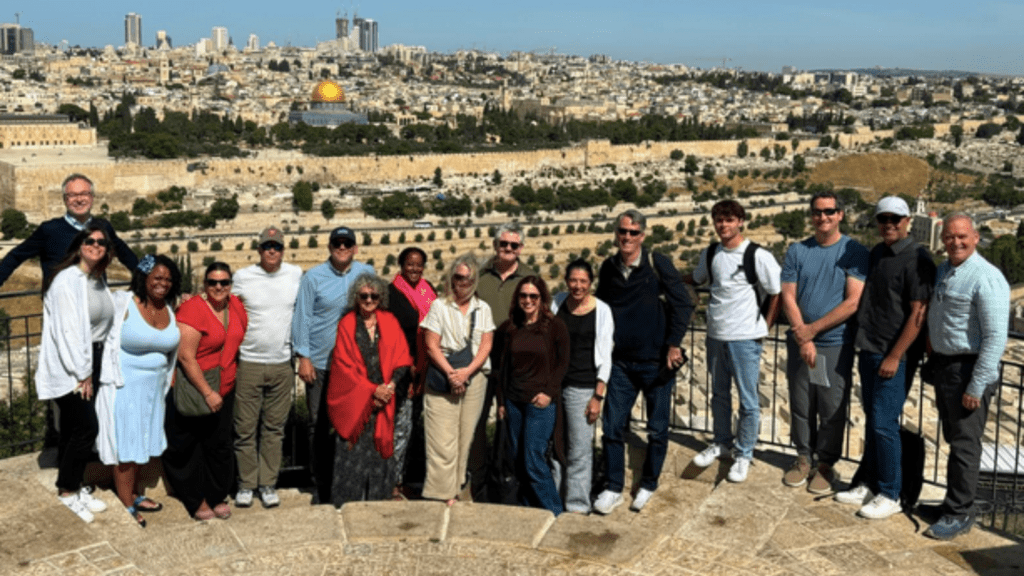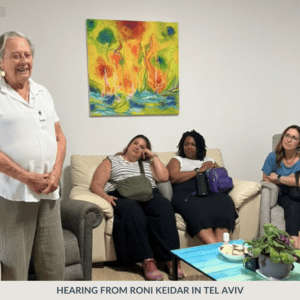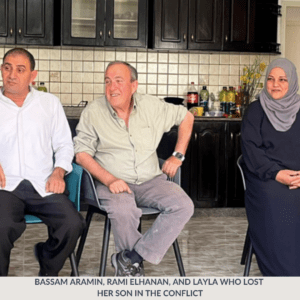
It’s still difficult to find words to adequately describe our recent solidarity trip to Israel and Palestine. I’m so grateful that Todd Deatherage did such a good job capturing so much of our trip in his recent reflection and also our conversation, it saves me from having to try to recount it all fully and then inevitably failing to do so. If you haven’t read Todd’s piece yet, please do.
Unlike other trips we’ve done with Telos in the past, this time we met mostly with Israeli Jewish peacemakers and Palestinian Christians and Muslims who are also committed to the work of peace and justice, and it’s hard to overstate the pain we encountered amongst all of them. All of them have endured shock and trauma and have had to keep choosing to hope, it’s just a matter of form, degree, and persistence. Since the 1940s, in the Holocaust and then the Nakba, both Jews and Palestinians have been living out of collective trauma passed on from and experienced by generation after generation, with October 7 and the war in Gaza only dramatically added to that cycle and perpetuates it. The Holy Land is a land of traumatized people. Both people react from trauma, and in the words of Abby Onn, an American-Israeli Jew who lost two family members on October 7, three others were kidnapped by Hamas, and one (Ofer Kalderon, age 53) who is still a hostage, “You can’t move forward from trauma until it ends.”
Being there this time one struggled not to feel hopeless for a better situation and peaceful and just resolution for both peoples. One struggles to pray to the Prince of Peace and the God of Justice when peace and justice feel so far off, especially while the Israeli military continues its devastation of Gaza and Hamas continues to hold hostages and lob rockets at Israel.
Because hope was hard to see, it was all the more powerful to interact with people—Israelis and Palestinans, Christians and Jews and Muslims—who still hold on to hope and are even more committed to a better future for all people in the Holy Land, in spite of the current situation.
Many of the Jewish people we met with said in various ways that the work they are doing for peace now is for the sake of their children and grandchildren yet to come, and that they are more committed to it than ever because there has to be a better and different way.
“I still feel we can’t keep shooting each other. Revenge is not going to work, we’ve tried this again and again and again and it just doesn’t work….To be honest, I don’t think we have any other choice than peace.”
 These are the words of Roni Keidar. I’ve been to Roni’s house several times on previous trips with Telos and Coracle. She’s a remarkable person, now in her 80s, a Jewish Israeli who has lived for decades in Netiv Ha’Sara, a village town not even a mile from the Gaza border, and the first to be attacked. For over forty years Roni has pursued peace between Israel and Palestine, and cared for and served her Palestinian neighbors, making many friends, and advocating for a better situation for the Palestinian people in Gaza. She’s given her life to love the Palestinian people in the interest of peace, compassion, and human dignity.
These are the words of Roni Keidar. I’ve been to Roni’s house several times on previous trips with Telos and Coracle. She’s a remarkable person, now in her 80s, a Jewish Israeli who has lived for decades in Netiv Ha’Sara, a village town not even a mile from the Gaza border, and the first to be attacked. For over forty years Roni has pursued peace between Israel and Palestine, and cared for and served her Palestinian neighbors, making many friends, and advocating for a better situation for the Palestinian people in Gaza. She’s given her life to love the Palestinian people in the interest of peace, compassion, and human dignity.
On October 7, Netiv Ha’Sara was brutally attacked by Hamas, Palestinian terrorists, and Roni and her husband barely escaped being murdered by hiding in their safe room while Hamas terrorists tried to beat down the door. Her daughter and family next door also miraculously escaped death. Still in a village of just 200 people, 21 other residents of this small kibbutz were slaughtered by Hamas fighters and many houses burned. Now displaced and living in north Tel Aviv, it took Roni some months to recover and find her feet again.
I wondered how her thoughts about peacemaking and mutual flourishing might have changed having lived through such horror and experienced so much loss in spite of so much effort. As we listened to Roni I began to get the impression that her convictions about the need for peace and justice had actually deepened, so I asked her directly, “Roni, it sounds like October 7 deepened your conviction about what you know to be true.” I was referring to her lifelong commitment to love one’s neighbor and mutual flourishing for all people in the Holy Land.
She cut off my question, “Yes, Yes…we can’t go any lower. We need outside help. I’m not forgetting October 7, I’m saying let’s put an end to it. Somehow sharing the land is the only way.”
After various meetings in Tel Aviv, we then journeyed to Bethlehem in the West Bank, which was absolutely empty of tourists. That was at least my 7th time to Bethlehem and I’ve never seen anything like it. It was literally empty except for the people who live there, devastating the local economy which is 80% reliant on tourism.
We were there to see many friends and take part in the Christ at the Checkpoint conference at Bethlehem Bible College. I’m always deeply inspired and challenged in my own discipleship of Jesus by these faithful evangelical Christians in Palestine who take seriously Jesus’ call to love your enemies and turn the other cheek while at the same time raise their voices and work for justice in the midst of deep, daily injustices and humiliation. Out of deep fidelity to the Scripture and the teachings of Jesus, they are tireless in their advocacy for a better way for Jews and Palestinians to live together, even if they are currently weary, grieving, and at times righteously angry at the disproportionate devastation and loss of life in Gaza. Many of them understand what is happening in Gaza to be genocide, with little hope for diminished military activity in Gaza by the IDF or that Hamas will cease its terrorist activities, and that similar dynamics might happen in the West Bank sooner rather than later.
And so words of hope coming from the Palestinian community are particularly powerful. Lamma Mansour from Nazareth gave a beautiful, powerful, stirring call to hope that, keeping her context in mind, I suggest you watch it. “Hope is our commitment to the Kingdom of God,” she said. It is not naive, optimism, or passive, but is honest, realistic, a transforming force compelling action. Hope is God in Christ and his upside down kingdom, which is both here and not yet, which is why we need more folks living in that kingdom here as a sign that it is not yet and still coming. She went on: Hope gives us the power to be bold. Hope gives us the power to persevere and persist. Hope give us the power to imagine, which is important because if we don’t imagine, others will do the imagining for us.
I needed this word, and others like it throughout the trip.
In the early part of the trip while still in Tel Aviv, I read a passage that had been assigned in the Spiritual Exercises of St. Ignatius, a nine month journey that I was finishing while on the trip. It was Isaiah 65.17-25, v17-18 that go like this: “For I am about to create new heavens and a new earth…be glad and rejoice forever in what I am creating; for I am about to create Jerusalem as a joy, and it’s people as a delight….”
I wrote in my journal:
It is quite a thing to read this whilst in bucolic Tel Aviv, on my way in a couple hours to Bethlehem in the West Bank, then Jerusalem. From where I sit this morning, Gaza is just 44 miles to the south, a vision of hell. Today, Jerusalem does not nearly approach this vision from Isaiah for all the people of this land, let alone the whole earth. And yet I believe, and the church teaches, that this vision will come to pass, that there will be a day when the ‘no mores’ and the ‘shall nots of this’ vision become reality for all people on this whole planet, which must be made new…’a new earth’. Even so, come quickly Lord Jesus.
And because this is the vision and the faith, we have come to this place. “Lord, make it so…small steps now and major developments for peace here, and across the world, until you make it all new, until you fulfill this prophecy you gave to your servant Isaiah 2,800 years ago in this very place.”
As an act of faith, I read aloud the passage again.
A couple of days later, we were preparing to go from Bethlehem to Jerusalem, the assigned reading was Revelation 21.1-7: “2 And I saw the holy city, the new Jerusalem, coming down out of heaven from God, prepared as a bride adorned for her husband. 3 And I heard a loud voice from the throne saying, “See, the home of God is among mortals. He will dwell with them; they will be his peoples, and God himself will be with them; 4 he will wipe every tear from their eyes. Death will be no more; mourning and crying and pain will be no more, for the first things have passed away.”
I wrote in my journal:
Sitting here in Bethlehem today, on the way to Jerusalem tomorrow (and will be up on the Mount of Olives praying), this vision / hope / future feels so far off today. Against the backdrop of such death, suffering, trauma, and injustice…it’s hard to keep faith. And yet, this is the faith.
Today, my dream for this is pretty simple…that people would stop killing and oppressing each other, and destroying the earth and trying to seize and hold on to power. v4 ‘and God will wipe away every tear from their eyes. Death will be no more; mourning and crying and pain will be no more, for the first things have passed away.’
What does stir my heart with longing and desire is the ‘being with God’ part of this vision. To be with God without having to try, or be disciplined, or call God’s presence to mind.
I can do some of that today.
Again, as an act of faith, I read the passage aloud again.
The following day we were up on the Mount of Olives, celebrating the Eucharist in the very spot where, 2,000 years ago when he triumphantly entered the city, Jesus wept over Jerusalem because the Jewish people then “did not know the things that make for peace”, and did not recognize the day of their visit by God incarnate in the man Jesus Christ, their Messiah and our Messiah. (Lk 19.41f) It seems to me that we, all of us, still don’t know the things that make for peace, for shalom.
But I know it has something to do with love of neighbor, love of enemy, non-violence, the Paschal Mystery, a commitment to mutual flourishing, our interconnectedness as a human race, an honest reckoning with past injustices, forgiveness, turning the other cheek, the willingness to give up something so that others might flourish…basically the teachings of Jesus that he modeled so that we might follow him. Even if one doesn’t believe in him, still Jesus Christ, the man and the message, truly is the hope of the world.
And so I did celebrate the Eucharist, with faith and conviction, in Jerusalem, on the Mount of Olives, on the spot where Jesus wept over the city…as a personal, defiant act of hope and faith that “Christ has died, Christ is risen, and Christ will come again.” That’s actually part of what is being proclaimed each time we celebrate and take the Eucharist…it is a statement that no matter how bad things are, there’s a better way, and that even if the darkness seems to be prevailing now, there is the truth that “the light shines in the darkness and the darkness has not overcome it.” (Jn 1.5).
Mitri Raheb, one Palestinian Christian we met with, coined the phrase and I like it, “Hope is what we do.”
Recently I heard from Mariah Humphries during our “Do You Want To Be Well” conference, that “Hope is an act of refusal.” Celebrating the Eucharist on the Mount of Olives, I refuse to believe that the current conflict between Israel and Palestine is how it has to be, I refuse to believe that one people must suffer for the flourishing of another, I refuse to believe that it is hopeless. And so I, with Todd and Telos and the other members of the trip, and Coracle, will continue to seek to be peacemakers, to learn and do whatever Jesus is talking about when he talks about “the things that make for peace.”
There is no other way.
Both Jewish Israelis and Palestinians that we met were unanimous, Whatever has happened in the past and whatever’s going on right now, it is NOT the way. To quote Roni again who said with an air of exasperation, “Who can tell me we’re on the right road?”
And also unanimous from the people we met with: Sharing the land is the only way, “This is a small country but there is room enough for the both of us”, People have to be pro-Israeli and pro-Palestian, “Children in Israel and children in Gaza have an equal right to life”, “We need people who are for both Israel and Palestine”.
 I was deeply struck by the words of Bassam Aramin, a Palestinian Muslim whose 12 year old daughter was killed by the IDF, shot in the back, “We are not doomed to keep killing each other.” I was deeply struck by the words of his partner and friend, Rami Elhanan, an Israeli Jew whose 14 year old daughter was killed by a Palestinian suicide bomber, “A little light can drive out a lot of darkness…we must harness the power of our pain for good.”
I was deeply struck by the words of Bassam Aramin, a Palestinian Muslim whose 12 year old daughter was killed by the IDF, shot in the back, “We are not doomed to keep killing each other.” I was deeply struck by the words of his partner and friend, Rami Elhanan, an Israeli Jew whose 14 year old daughter was killed by a Palestinian suicide bomber, “A little light can drive out a lot of darkness…we must harness the power of our pain for good.”
I was deeply struck by the words of Palestinian Christians. “We are a people of love. We are a people of resurrection. Let us carry our cross as we go.” And, “Let us rise up, because Jesus rose from the grave.”
On the journey,

NB: Thank you to those who supported me to make this trip possible, you know who you are. If you want to stay up to date on issues in Israel and Palestine, I strongly suggest signing up for the Telos newsletters. Coracle will continue to elevate the value of peacemaking as an essential aspect of Christian discipleship, wherever peace is lacking and wherever justice needs to be found. Jesus said, “Blessed are the peacemakers, for they will be called children of God.” (Mt 5.9). This matters, and we want to understand it better so we can do it more, for Christ’s sake, and the sake of others, and for our own sake too.
